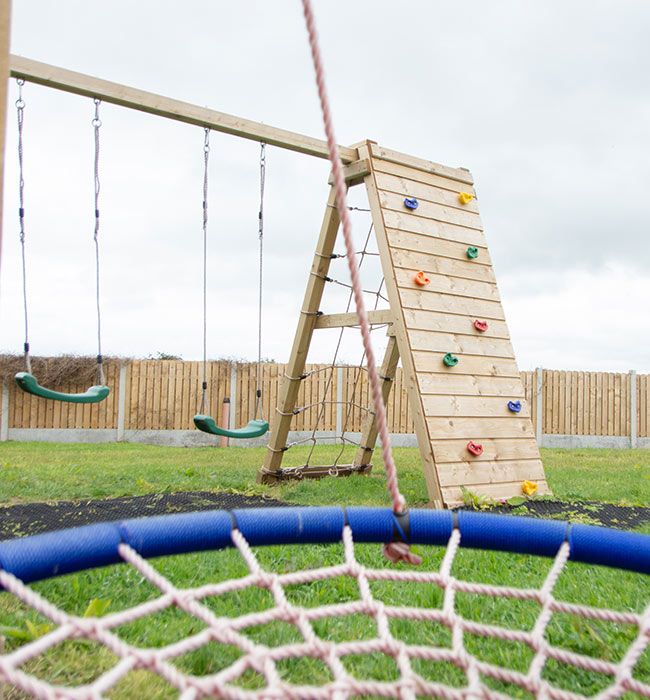24 October 2019
Personalising the Power of Play
One of the cornerstones upon which Resilience is built is our commitment to empowering every child or young adult with whom we work: focusing not on what they cannot do, but on what they can achieve. Truly putting this into practice means taking a completely person-centred approach to the support we give each of our service users – and it’s this spirit of individual understanding that is behind an exciting new, state-of-the-art children’s playground, at one of our residential services in Kerry.
Observing, Understanding, Responding
The investment in the playground was inspired by the very specific needs of one child, and the beginning of an important success story. Resident at the house, ‘Tom’, is a child with an intellectual disability, and whose natural inclination is to climb. Children with special needs often have different ‘sensory preferences’, with the body looking for specific sensations or ‘sensory inputs’. Helping a child to satisfy these natural sensory needs can go a long way towards regulating the body – preventing agitation and improving behaviour.
Tom’s Support Managers and specialist team understood that climbing is a sensory preference for him, and that he has an innate athletic ability. How could he be allowed to explore this in a safe, risk-enabled environment? Could specific equipment, available in his own home, in a secure space, help him benefit and flourish? A specially-constructed playground in the garden of the house was the natural solution.
The playground was developed by Resilience’s Senior Occupational Therapist, – working together with the Manager of the Kerry house, Mary Costelloe – and the carefully-selected playground supplier, Creativity Play. A highly-personalised approach was taken, and the team worked to create items specially tailored to Tom’s needs, and those of the other children in the house – from a sensory and educational perspective.

The playground has already played a huge part in Tom’s journey – helping with his sensory development and giving his body what it needs to minimise agitation. Another important benefit is that the playground is serving as a ‘stepping stone’ towards taking Tom beyond the house and out into the community to pursue his love for climbing; the goal is for him to have progressed to a point where he can safely spend time at the Climbing Wall in Kerry.
Access for Everyone
Great care was taken to make sure the playground would be as inclusive as possible for all of the young people we support, with some appealing to very specific instinctive sensory needs. Another young person, ‘Daniel’, uses a wheelchair for mobility, so the playground was designed to include a special bucket swing so that Daniel can move in and out of the swing, by himself, with ease. What’s more, the roundabout is wide enough to accommodate Daniel’s wheelchair. For the first time, Daniel is not excluded from play time with the other children: and in this way the playground is contributing not only to his sensory development, but to his social well-being too. He is learning to play alongside others – and will know what to expect when he is ready to visit a public playground.
Caring to Calm
We’ve truly been excited to see how different children are benefiting from the playground in different ways. While it is sensory-stimulating for some, for others it helps bring about calm and a sense of well-being. ‘Ryan’ has autism and sometimes presents with behaviours, which make it difficult to take him into a public playground environment. Now he has a playground in his own back garden – and the activity is proving to have very positive effects on his behaviour. The combination of fresh air, and the rocking motion of the swing has introduced new calm and relaxation into Ryan’s life.
The €18,000 playground development is just one way we, at Resilience, are shaping solutions around the needs of those we support – providing social care that encourages individual empowerment in safe and managed ways.
Note: The names of children have been changed to protect the privacy of individuals.

